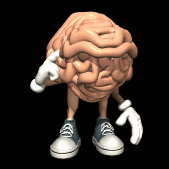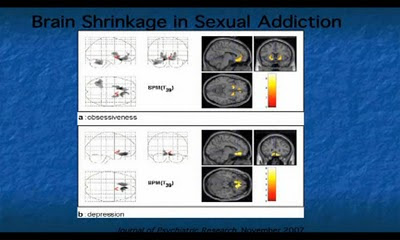Neuroscience


No definite peer reviewed work that I could find...
However a recent blog post by Dr. Donald L. Hilton, Jr., a Mormon spine surgeon and Clinical Associate Professor of Neurosurgery at University of Texas Health Sciences Center, claimed otherwise:
In this video, Dr. Hilton stretches the truth about the existence of evidence demonstrating that pornography addiction changes the brain.
"A study looking at a form of sexual addiction showed the same thing [as studies on cocaine addiction and obesity], that those frontal lobes actually got smaller in addiction, in sexual addiction."

What he doesn't tell you is that the paper is on adult male pedophiles, convicted child molesters incarcerated at high-security forensic treatment facilities in Germany (Schiffer et al., 2007). These individuals go well beyond the pale of your average teenage wanker. In fact, it's rather offensive that he covertly uses a flagrant example of sexual pathology to illustrate his point. But he has to, because there are no other studies out there.
Hilton is more forthcoming about these results in his blog post:
Incorporation of the "addiction" and "dopamine" and "neuroplasticity" buzzwords is a new addition to their strategy. In the end, secular neuroscientists (i.e., most of us) should be upset that our work is being used for such purpose.
- The Picower Institute
The Picower Institute for Learning and Memory at MIT's Brain and Cognitive Sciences Complex (pictured), the largest neuroscience research facility in the world, just opened Dec 2005 and is generating some fascinating research. (Like the window in...
- Alternative Rewards Could Help The Battle Against Addiction
The claws of addiction are hard to escape because other more salubrious rewards, like food and relationships, gradually lose their value - so goes the popular belief. But now Magalie Lenoir and Serge Ahmed have conducted studies on heroin-addicted rats...
- Does "internet Addiction" Really Shrink Your Brain?
Internet addiction is a murky and controversial disorder that is the subject of intense debate over whether it should be included in the new DSM-V. Here are the proposed diagnostic criteria as developed by Dr. Kimberly Young: Do you feel preoccupied...
- "starving Is Just Like Ecstasy For Anorexics"...no!!
Say it isn't so! Gad, here's another sensationalistic headline to deconstruct: Starving is like ecstasy use for anorexia sufferers 09:00 02 October 2007 NewScientist.com news service Alison MotlukAnorexia and ecstasy use activate...
- Faces & Voices Of Recovery Internship!
Faces & Voices of Recovery is a national organization working to mobilize, organize and rally the over 20 million Americans in long-term recovery from addiction, their families, friends and allies in a campaign to end discrimination and achieve a...
Neuroscience
Is There Any Evidence for the "Porn-Addicted Brain"?


No definite peer reviewed work that I could find...
However a recent blog post by Dr. Donald L. Hilton, Jr., a Mormon spine surgeon and Clinical Associate Professor of Neurosurgery at University of Texas Health Sciences Center, claimed otherwise:
Can pornography use become an actual brain addiction?. . .Ten years ago evidence began to point to the addictive nature of over-consumption of natural behaviors which cause a dopaminergic reward to be experienced in the brain. For instance, Dr. Howard Schaffer, Director of Addiction Research at Harvard University, said in 2001, “I had great difficulty with my own colleagues when I suggested that a lot of addiction is the result of experience … repetitive, high-emotion, high-frequency experience. But it’s become clear that neuroadaptation–that is, changes in neural circuitry that help perpetuate the behavior–occurs even in the absence of drug-taking.” In the decade since he said this, he has focused his research more and more on the brain effects of natural addictions such as gambling...The experts are fond of saying that addiction occurs when a habit “hijacks” brain circuits that evolved to reward survival- enhancing behavior such as eating and sex.Pretty typical stuff about behavioral addictions and the overworked "neuroplasticity" concept. Is it even worth writing about any more? It is when a scholarly sounding science article written by a neurosurgeon appears on the website of a recovery organization driven by religious motives. The S.A. Lifeline Foundation condones only one type of sex: that between a married man and his wife. Everything else is wrong. Banish masturbation entirely. What if you're not married? You can look forward to a life of celibacy! No sex of any kind for you. And it's no surprise they promote reparation therapy to cure homosexuality:
What good is that?? The proscriptions of S.A. Lifeline Foundation are not only boring, they're harmful. The propagation of such degrees of guilt and shame throughout society is one reason why LGBT youth like Tyler Clementi kill themselves at alarming rates. So whatever your position on pornography and sexual addiction (Yes It Exists: the sex addicted brain! and Cupid's Poisoned Arrow; No It Doesn't: The Rogue Neuron and Dr Petra), it's clear that cloaking prudish sexual morality in the guise of science will make it more palatable to a wider audience.Same Sex Attraction
For individuals experiencing unwanted same-sex-attraction (SSA), or same-gender-attraction (SGA), achieving sexual sobriety and recovery is crucial. Often they can feel a deep level of shame because of society’s tendency to automatically label all such as actively “gay” or “lesbian”. Many with these attractions have never experienced this lifestyle and many are married to a spouse who is heterosexual. Most have kept their attractions secret – which in many cases fuels a secret addiction to homosexual pornography or fantasy. Others wish to leave their former lifestyle and are seeking understanding and acceptance, but cannot seem to get past the continued pull of pornography and masturbation. Sexaholics Anonymous (SA) can help. SA is the only fellowship dealing with this addiction which defines “sobriety” for married persons as: no form of sex with self or with persons other than the spouse – meaning one’s partner in a marriage between a man and a woman. For the unmarried, sobriety means freedom from sex of any kind. For both the goal is progressive victory over lust.
In this video, Dr. Hilton stretches the truth about the existence of evidence demonstrating that pornography addiction changes the brain.
"A study looking at a form of sexual addiction showed the same thing [as studies on cocaine addiction and obesity], that those frontal lobes actually got smaller in addiction, in sexual addiction."

What he doesn't tell you is that the paper is on adult male pedophiles, convicted child molesters incarcerated at high-security forensic treatment facilities in Germany (Schiffer et al., 2007). These individuals go well beyond the pale of your average teenage wanker. In fact, it's rather offensive that he covertly uses a flagrant example of sexual pathology to illustrate his point. But he has to, because there are no other studies out there.
Hilton is more forthcoming about these results in his blog post:
So what about sexual addiction? In 2007 a VBM [voxel-based morphometry] study out of Germany looked specifically at pedophilia, and demonstrated almost identical finding to the cocaine, methamphetamine, and obesity studies. The significance of this study in relation to our topic cannot be overemphasized. It demonstrates that a sexual compulsion can cause physical, anatomic change in the brain, i.e., harm.Sure, compulsive overconsumption of porn that intrudes upon one's daily life and hinders the ability to have healthy relationships is problematic, even when the viewer is not a criminal. And the escalating levels of violence, and weirdness, of internet video can add fuel to the fire. Religious organizations use this as an excuse for promoting campaigns to condemn any form of sex that occurs outside of holy matrimony.
Incorporation of the "addiction" and "dopamine" and "neuroplasticity" buzzwords is a new addition to their strategy. In the end, secular neuroscientists (i.e., most of us) should be upset that our work is being used for such purpose.
- The Picower Institute
The Picower Institute for Learning and Memory at MIT's Brain and Cognitive Sciences Complex (pictured), the largest neuroscience research facility in the world, just opened Dec 2005 and is generating some fascinating research. (Like the window in...
- Alternative Rewards Could Help The Battle Against Addiction
The claws of addiction are hard to escape because other more salubrious rewards, like food and relationships, gradually lose their value - so goes the popular belief. But now Magalie Lenoir and Serge Ahmed have conducted studies on heroin-addicted rats...
- Does "internet Addiction" Really Shrink Your Brain?
Internet addiction is a murky and controversial disorder that is the subject of intense debate over whether it should be included in the new DSM-V. Here are the proposed diagnostic criteria as developed by Dr. Kimberly Young: Do you feel preoccupied...
- "starving Is Just Like Ecstasy For Anorexics"...no!!
Say it isn't so! Gad, here's another sensationalistic headline to deconstruct: Starving is like ecstasy use for anorexia sufferers 09:00 02 October 2007 NewScientist.com news service Alison MotlukAnorexia and ecstasy use activate...
- Faces & Voices Of Recovery Internship!
Faces & Voices of Recovery is a national organization working to mobilize, organize and rally the over 20 million Americans in long-term recovery from addiction, their families, friends and allies in a campaign to end discrimination and achieve a...
